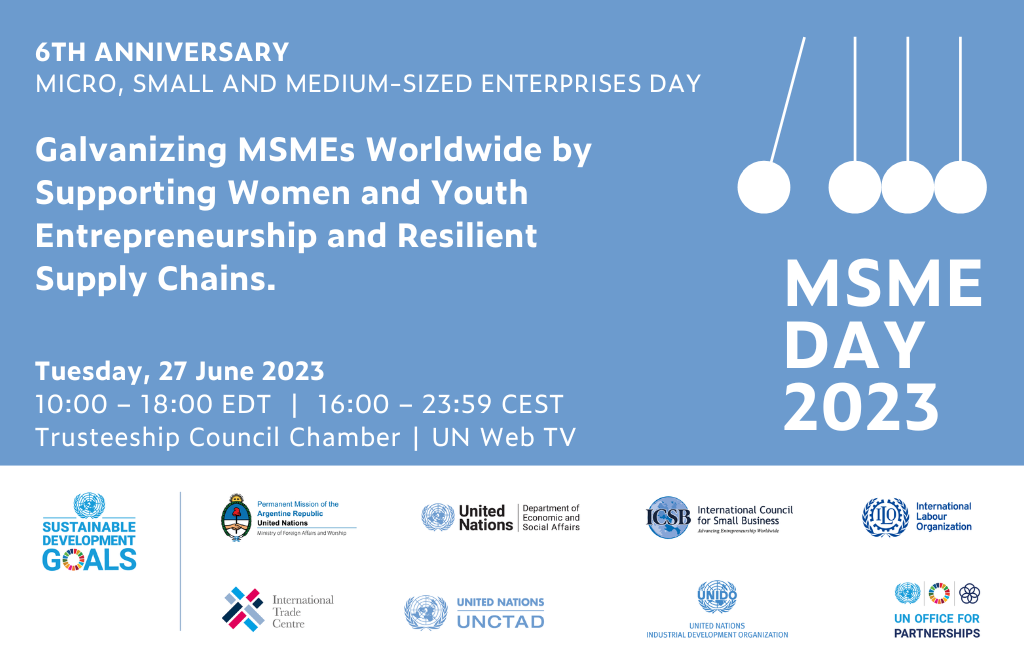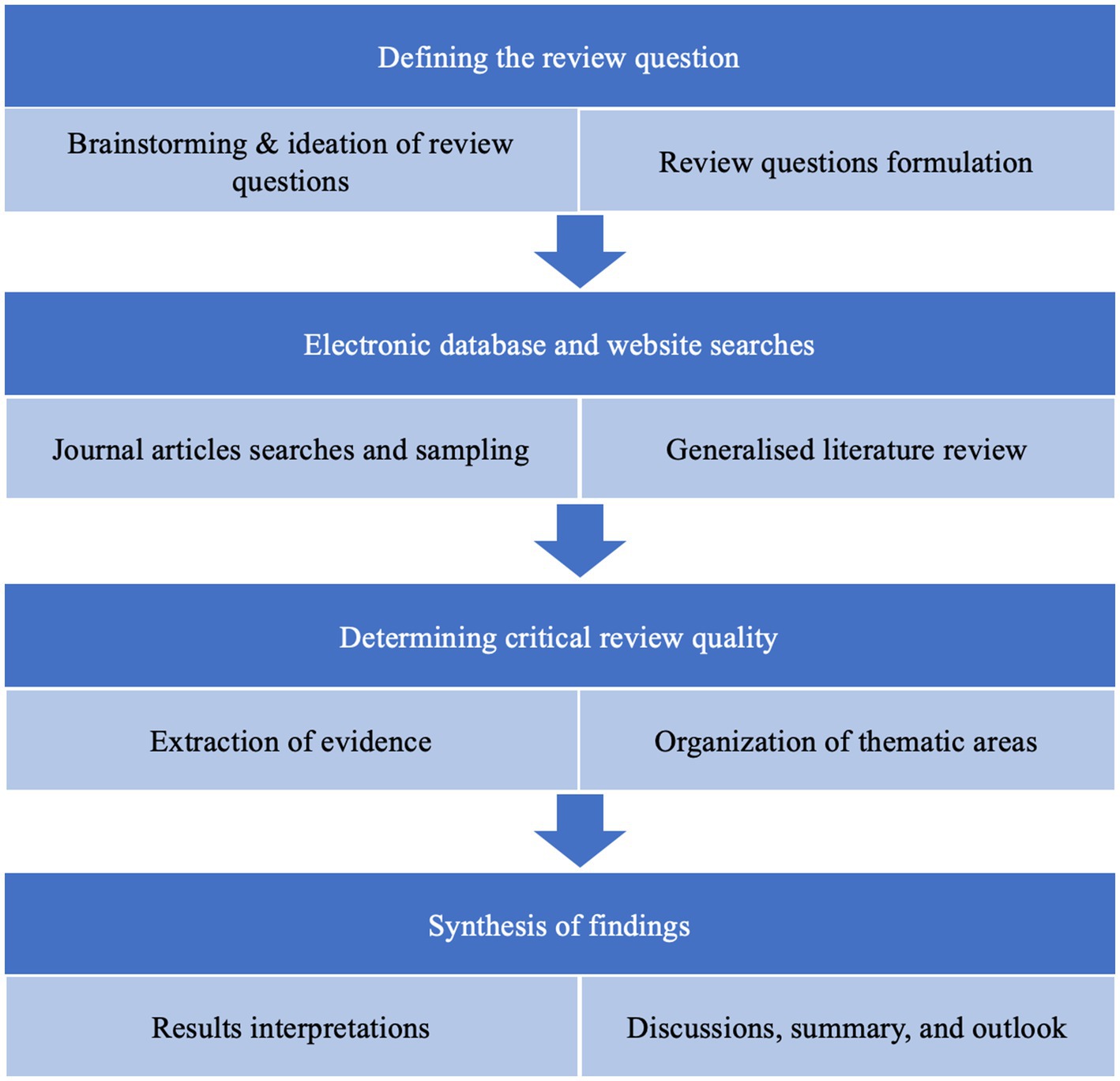
Galvanizing MSMEs worldwide by supporting women and youth entrepreneurship and resilient supply chains
Multiple simultaneous shocks and crises have disturbed the global working environment for entrepreneurs and micro-, small and medium-sized enterprises (MSMEs). In addition, conflicts, commodity dependence, geopolitical tensions, and pandemics drive social and economic instability, making MSMEs extremely vulnerable to rising inflation and supply chain disruptions.
Among the most vulnerable, women- and youth-owned enterprises are often at risk of external shocks. This is when the percentage and overall number of business formations by women and youth are increasing worldwide. However, facing limited access to affordable finance, capacity-building support, partnership networks, and global markets, women and young entrepreneurs need help to overcome the numerous challenges that frequently stifle the growth of their businesses, confining many of them to informality or necessity entrepreneurship.
Policies that strengthen capacities and support MSMEs development and entrepreneurship for women and youth need to be at the forefront to address those challenges, lower and remove barriers, and provide an operating environment for women- and youth-owned businesses to grow, thus contributing to the full achievement of SDGs 1, 4, 5, 8, 9, 10 and the “leave no one behind” promise of the 2030 Agenda for Sustainable Development and its Sustainable Development Goals.
This MSMEs day will also focus on supporting resilient supply chains to ensure workers and the environment benefit. Supply chains are a critical component of global trade and commerce, and conflicts, disasters, and pandemics can quickly impact their functioning, increasing costs and making transactions more difficult. Therefore, policymakers and businesses must join forces to ensure economically viable, socially, and environmentally sustainable supply chains.
2023 Event
27 June 2023
UNHQ, New York
9:30 AM – 5:30 PM EST
Join us for MSME Day 2023, a dynamic event dedicated to celebrating the crucial role of Micro-, Small and Medium-Sized Enterprises (MSMEs) in achieving the 2030 Agenda for Sustainable Development.
Background
MSMEs account for 90% of businesses, 60 to 70% of employment and 50% of GDP worldwide. As the backbone of societies everywhere they contribute to local and national economies and to sustaining livelihoods, in particular among the working poor, women, youth, and groups in vulnerable situations.
MSMEs hold the potential to transform economies, foster job creation, and promote equitable economic growth if given adequate support. The MSME Day event aims to highlight their pivotal role and explore opportunities for their further advancement.
The United Nations General Assembly designated 27 June as “Micro-, Small, and Medium-sized Enterprises Day” (A/RES/71/279) to raise awareness of the tremendous contributions of MSMEs to the achievement of the United Nations Sustainable Development Goals (SDGs).
SDGs, Targets, and Indicators
-
SDG 1: No Poverty
- Target 1.4: Ensure that all men and women, in particular the poor and the vulnerable, have equal rights to economic resources, as well as access to basic services, ownership, and control over land and other forms of property.
- Indicator: Percentage of women and youth with access to affordable finance and capacity-building support for entrepreneurship.
-
SDG 4: Quality Education
- Target 4.4: By 2030, substantially increase the number of youth and adults who have relevant skills, including technical and vocational skills, for employment, decent jobs, and entrepreneurship.
- Indicator: Percentage of youth with access to capacity-building support for entrepreneurship.
-
SDG 5: Gender Equality
- Target 5.1: End all forms of discrimination against all women and girls everywhere.
- Indicator: Percentage and overall number of business formations by women.
-
SDG 8: Decent Work and Economic Growth
- Target 8.3: Promote development-oriented policies that support productive activities, decent job creation, entrepreneurship, creativity, and innovation.
- Indicator: Percentage and overall number of business formations by youth.
-
SDG 9: Industry, Innovation, and Infrastructure
- Target 9.3: Increase the access of small-scale industrial and other enterprises, in particular in developing countries, to financial services, including affordable credit, and their integration into value chains and markets.
- Indicator: Percentage and overall number of business formations with access to global markets.
-
SDG 10: Reduced Inequalities
- Target 10.2: By 2030, empower and promote the social, economic, and political inclusion of all, irrespective of age, sex, disability, race, ethnicity, origin, religion, or economic or other status.
- Indicator: Percentage and overall number of business formations by women and youth.
Table: SDGs, Targets, and Indicators
| SDGs | Targets | Indicators |
|---|---|---|
| SDG 1: No Poverty | Target 1.4: Ensure that all men and women, in particular the poor and the vulnerable, have equal rights to economic resources, as well as access to basic services, ownership, and control over land and other forms of property. | Percentage of women and youth with access to affordable finance and capacity-building support for entrepreneurship. |
| SDG 4: Quality Education | Target 4.4: By 2030, substantially increase the number of youth and adults who have relevant skills, including technical and vocational skills, for employment, decent jobs, and entrepreneurship. | Percentage of youth with access to capacity-building support for entrepreneurship. |
| SDG 5: Gender Equality | Target 5.1: End all forms of discrimination against all women and girls everywhere. | Percentage and overall number of business formations by women. |
| SDG 8: Decent Work and Economic Growth | Target 8.3: Promote development-oriented policies that support productive activities, decent job creation, entrepreneurship, creativity, and innovation. | Percentage and overall number of business formations by youth. |
| SDG 9: Industry, Innovation, and Infrastructure | Target 9.3: Increase the access of small-scale industrial and other enterprises, in particular in developing countries, to financial services, including affordable credit, and their integration into value chains and markets. | Percentage and overall number of business formations with access to global markets. |
| SDG 10: Reduced Inequalities | Target 10.2: By 2030, empower and promote the social, economic, and political inclusion of all, irrespective of age, sex, disability, race, ethnicity, origin, religion, or economic or other status. | Percentage and overall number of business formations by women and youth. |
The article addresses multiple SDGs, including SDG 1 (No Poverty), SDG 4 (Quality Education), SDG 5 (Gender Equality), SDG 8 (Decent Work and Economic Growth), SDG 9 (Industry, Innovation, and Infrastructure), and SDG 10 (Reduced Inequalities).
Based on the article’s content, specific targets under these SDGs can be identified. For example, Target 1.4 (Ensure that all men and women, in particular the poor and the vulnerable, have equal rights to economic resources) is relevant to the issue of limited access to affordable finance for women and youth entrepreneurs. Target 4.4 (Increase the number of youth and adults with relevant skills for employment and entrepreneurship) relates to the need for capacity-building support for young entrepreneurs. Target 5.1 (End all forms of discrimination against women and girls) is connected to the challenges faced by women-owned enterprises. Target 8.3 (Promote development-oriented policies that support entrepreneurship) addresses the need for policies that facilitate the growth of MSMEs. Target 9.3 (Increase access to financial services for small-scale enterprises) relates to the issue of limited access to affordable credit for MSMEs. Target 10.2 (Promote social and economic inclusion) is relevant to the aim of empowering women and youth entrepreneurs.
The article mentions indicators that can be used to measure progress towards the identified targets. For example, the percentage and overall number of business formations by women and youth can serve as indicators
Behold! This splendid article springs forth from the wellspring of knowledge, shaped by a wondrous proprietary AI technology that delved into a vast ocean of data, illuminating the path towards the Sustainable Development Goals. Remember that all rights are reserved by SDG Investors LLC, empowering us to champion progress together.
Source: un.org

Join us, as fellow seekers of change, on a transformative journey at https://sdgtalks.ai/welcome, where you can become a member and actively contribute to shaping a brighter future.







